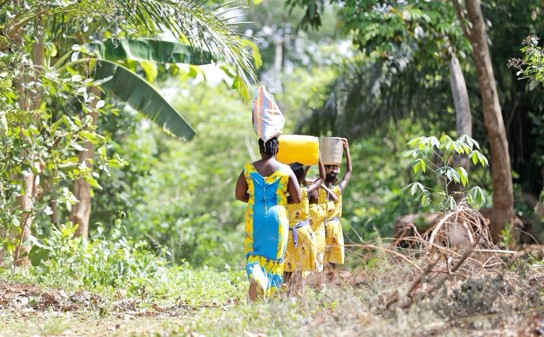Mar 24, 2021 | by Amelia Kuklewicz & Bobbi Gray, Grameen Foundation

Photo credit: Grameen Foundation
The ILO estimates 1.6 billion school children have been negatively impacted by the COVID-19 pandemic as schools have shut down or parents have not been able to afford sending their children to school. The ILO also estimates that, globally, the equivalent of 400 million full-time jobs were lost because of COVID-19 in the second quarter of 2020 alone; many of the jobs hardest hit are in sectors where women dominate, such as in women’s micro and small enterprises. Even prior to the pandemic, women entrepreneurs struggled to balance their caretaking practices with their business responsibilities, resulting in their children joining their mother at the place of business or in some cases, picking up the slack in caretaking and household chores or working directly in the business as low-cost labor. Children’s engagement in a woman’s business, while in positive cases is a training ground for future marketable skills, can also result in the unintended consequence of child labor or exposure to workplace hazards, such as chemical exposure, burns, cuts, harassment, etc.
The reality of this balancing act is not difficult to comprehend. How many of us working parents have held zoom calls while bouncing a baby due to temporary child care constraints or kept our children busy doing household chores while we finish up reports due to school closures? While these would not constitute child labor and may not even be defined as work, prolonged reliance upon our children to pick up tasks that can harm them or result in their low academic achievement could cross the line into child labor. Would you know where to draw the line?
In many of the countries where Grameen works, children working with their parents is commonplace. Children’s wages and their substitution of their parents’ chores or caretaking responsibilities can both be critical to the household’s financial bottom line and can mean the difference between eating a meal, covering school fees or taking someone to the doctor.
Last year, Grameen Foundation, along with our partner American Bar Association Rule of Law Initiative, completed research as part of the Reducing Incidence of Child Labor and Harmful Conditions of Work in Economic Strengthening Initiatives (RICHES) program and that assessed the interaction between women’s enterprises and child labor and found that many children that are classified as working in conditions of child labor, work right alongside their parents, contradicting our visions of children begging on the streets or working in as forced or slave labor. While these worst forms of child labor do occur, RICHES is focusing most on the forms of child labor that may occur in women’s businesses. Our research is being used to develop a toolkit for our partners to use to help mitigate the unintended consequence of child labor or hazardous work occurring in women’s enterprises.
To be honest, coupling child labor and women’s entrepreneurship in the same sentence is uncomfortable. However, we do see promising ways to address this relationship, by emphasizing the importance of child protection. Practical strategies and activities to increase child protection within women’s businesses include
COVID-19 has increased the urgency for such a toolkit as women’s businesses have closed, income streams have been drastically reduced further pushing households into poverty, and schools have closed or operate with limited in-person education. Women entrepreneurs and their households need help balancing the competing financial goals such as keeping food on the table, solidifying their children’s education, health and future alongside keeping business doors open.
We’re inviting practitioners, investors, donors, and our peers to review and provide feedback on our toolkit. If you would like to review any of our tools or learn more about our RICHES initiative, please contact us at riches@grameenfoundation.org.
Amelia Kuklewicz, Regional Director for Latin America, the Caribbean and Asia and Bobbi Gray, Research Director, Grameen Foundation, both support Grameen Foundation’s Reducing Incidence of Child Labor and Harmful Conditions of Work in Economic Strengthening Initiatives (RICHES) program.
Categories: Global Women and Girls English Blog 2021 WebinarsBlogs

1621 North Kent Street, Ste 900,
Arlington, VA, 22209
P 202.534.1400
F 703.276.1433
Website Photos: © mari matsuri
